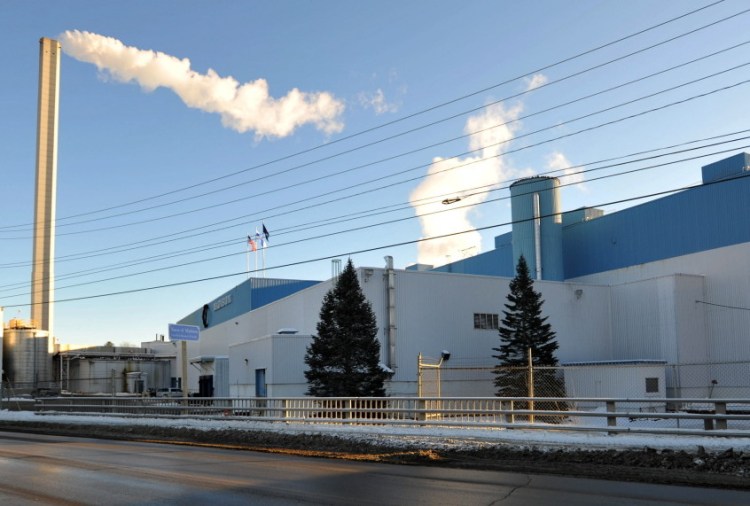The U.S. Department of Commerce is slapping a stiff duty on Canadian imports of glossy paper, providing some breathing room for Maine’s struggling paper mills.
The move could come with a cost, however, because two of the four Canadian companies targeted by the tariff have operations in Maine. Gov. Paul LePage has said the government’s action could threaten 1,200 jobs in the state.
The International Trade Commission, which is part of the Commerce Department, said Wednesday that Canadian mills that produce supercalendered paper are receiving unfair subsidies, and that buyers will now have to pay a duty of between 17.87 percent and 20.18 percent for paper imported from mills in Canada.
The tariff applies only to supercalendered paper, a coated, glossy paper often used in magazines and promotional materials. Four mills in Canada produce supercalendered paper – Resolute, Irving, Catalyst and Port Hawkesbury.
Canadian government subsidies to that country’s paper industry have long been a point of contention between the U.S. and Canada. The ITC said Canada exported nearly 1.1 metric tons of supercalendered paper worth $868.4 million to the U.S. in 2014.
Maine-based Madison Paper and Verso Corp., which operates a mill in Jay, had requested the ITC investigation. Both operations have struggled. In January, Madison laid off more than 100 workers temporarily, blaming the Canadian subsidies for allowing competitors, especially the Port Hawkesbury mill, the largest producer of supercalendered paper in North America, to produce lower-cost paper. Verso announced two months ago that it will be cutting 300 jobs from the Jay mill, and the New York Stock Exchange delisted Verso’s stock in September because of its low stock price. Shares have sold for as little as 3 cents during the past year.
Madison Paper requested that the federal government investigate the subsidies to Port Hawkesbury in October 2012, and a formal investigation was opened the following March.
Neither Madison nor Verso commented on the ITC’s decision.
POSSIBLE THREAT TO MAINE MILLS
Maine Sens. Susan Collins and Angus King praised the ITC’s decision Thursday, saying it would help level the playing field, particularly for Madison Paper. But they also were critical of the ITC’s decision to investigate the subsidies only at Port Hawkesbury and Resolute Forest Products, while imposing tariffs on all four mills that produce supercalendered paper. The other two Canadian mills – Irving Paper and Catalyst – weren’t investigated, but got lumped into an “all others” category and are subject to tariffs of 18.85 percent.
During the course of the investigation, LePage, King and Collins all urged the ITC to investigate Irving and Catalyst separately, saying some of the subsidies provided to the other mills, particularly Port Hawkesbury, weren’t available to them.
LePage wrote two letters – one to the White House and the other to the ITC – asking for separate investigations of Irving and Catalyst, which have operations in Maine. Irving has sawmills in Dixfield and Ashland and owns 1.2 million acres of woodlands, which represents about 7 percent of Maine’s forestlands. The company has 389 direct employees in Maine and supports 777 jobs through 97 woodlands contractors, said Mary Keith, an Irving spokeswoman.
Catalyst bought a paper mill in Rumford from NewPage in January, a condition of a deal for Verso Paper to purchase NewPage. The mill employs roughly 650 people.
CANADA MILLS MAY TRY WORKAROUND
In July, LePage wrote to the White House to protest the “unreasonable way” the Commerce Department was handling the investigation into how some Canadian mills were receiving government subsidies.
“While I appreciate the effort to create a more level playing field for companies here in the United States and Maine, the proposed process of handling this investigation will have a profound negative impact on the state of Maine,” LePage wrote. “Both Irving Paper and Catalyst Paper have significant investments in our state, and together employ more than 1,200 Mainers and support thousands of indirect jobs. An unfair investigation will put not only these jobs at risk, but any future job creation. Maine and the United States can’t afford to lose these jobs.”
Attempts to reach LePage for comment were unsuccessful Thursday.
However, an industry analyst said the government’s decision won’t necessarily protect U.S. mills as expected because Canadian paper mills might have a way to get around the tariffs imposed on its U.S. customers.
Jesse Marzouk, a paper industry analyst with Hilco Global in Chicago, said Port Hawkesbury, a mill in Nova Scotia, could avoid losing customers who don’t want to pay a tariff – which, like a sales tax, is paid by the buyer. Marzouk said the company has previously said it would consider setting up a U.S. operation, pay the tariffs itself, and then sell the paper to its American buyers. Its profit would decrease, but it would maintain its customer base.
When the ITC issued a preliminary finding this summer that the companies were unfairly benefiting from government subsidies, Port Hawkesbury indicated it might follow that route, Marzouk said.
“If they do what they say they will do, I don’t think much will change,” he said.
Staff Writer Whit Richardson contributed to this report.
Send questions/comments to the editors.




Comments are no longer available on this story